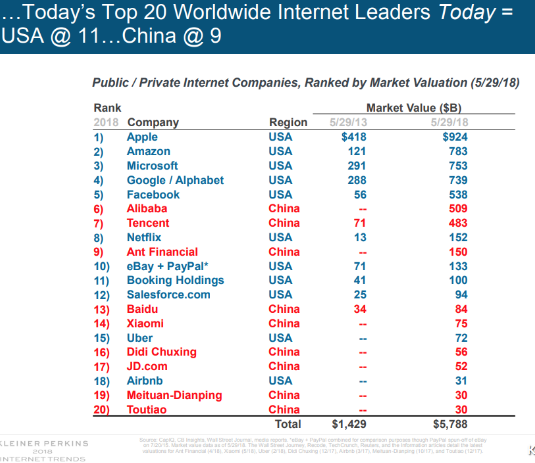Here’s the Financial Times:
Caught in the middle is Silicon Valley. Many US technology companies are concerned that China is using unfair and even illicit tactics to get ahead. But there are also rampant fears that the Trump administration’s approach could backfire. When the export controls notice was released, US technology lobbyists in Washington were at pains to explain that they were at risk of losing access to a big market for their new products, and of losing the ability to share information with Chinese researchers, which could help them develop more cutting-edge products. Many policy analysts agree that the US may be in danger of going too far.
“It is fair and appropriate for countries to defend their economic crown jewels from foreign exploitation or infringement,” wrote Ryan Hass and Zach Balin of the Brookings Institution in a report this month. But the US needed “to avoid inflicting self-harm”. The “big picture”, they added, was one in which both the US and China were increasing the distance between themselves and the rest of the world on innovation, partly by feeding off each other. (emphasis added)
In some respects (including certain cultural traits such as embracing creative destruction), the US has a more in common with China than it does with Japan or Europe. Consider the following list of the world’s top 20 internet companies.
In fairness, that list does not include other forms of “tech”, such as biotech or hardware producers like Samsung. Nonetheless, it’s surprising the extent to which the global internet industry is dominated by firms from America and China (a developing country with a per capita income slightly below that of Mexico.) Where are Europe and Japan?
I doubt whether the current US trade war with China will have much long run impact—Trump has already shown himself to be a rather ineffective negotiator. Rather than slow the rise of China, an all out trade war would be more likely to help Europe and Japan catch up to the US.
PS. When I first met my wife she told me that she thought the US was trying to prevent the rise of China. I told her that she was wrong. Recently I admitted to her that she’d been right and I was wrong.



READER COMMENTS
Philo
Feb 4 2019 at 11:57pm
Talk about what a collective entity, such as a nation, is “trying” to do is fraught with conceptual obscurity.
Benjamin Cole
Feb 5 2019 at 6:13am
Preventing the rise of China is a fool’s game. 1.4 billion people, strong culture, embracing technology, a pro-growth government.
Beijing runs a dirigiste, mercantilist, authoritarian regime, getting rather worse than better.
But likely unstoppable. The People’s Bank of China is willing to promote growth, and despite that, China is below inflation targets. The PBoC does not recognize “moral hazard,” which is heresy in the West but oddly a strength, as the PBoC buys bad loans and leaves the financial system strong. There will be no collapse of the Sino financial system, or over-indebtedness. It does not make sense in their system.
The US is best off developing lots of jobs in the US, and minding its own business. It is possible that Japan, Taiwan, Australia, Korea, Thailand and possibly India can form a worthy defense pact, and make outright invasions prohibitively expensive. Certainly the technology and the numbers are there for self-defense.
Todd Kreider
Feb 6 2019 at 1:18am
Actually, no. Even an out right trade war wouldn’t change the countries’ GDPs per capita at a rate worth mentioning.
Warren Platts
Feb 6 2019 at 4:20pm
You were right. The USA actively encouraged and promoted and boosted China’s growth. The narrative that the multinationals paid to have propagated was that “engagement” would cause China to become a Western-like democracy, sort of like Japan, or South Korea, or Taiwan.
Now that that hope–it never was a true strategy–has proven to be forlorn, your wife is right. The USA is, and needs to, contain China’s rise for the sake of the entire free world. China’s rise is the gravest danger to the international order that has happened since 1933 Germany.
Benjamin Cole
Feb 8 2019 at 5:15am
“Xi sees no place for political experimentation or liberal values in China, and regards democratization, civil society and universal human rights as anathema,” wrote Steve Tsang, the director of the SOAS China Institute at the University of London’s School of Oriental and African Studies.
—30—
One can hope for the best….but a quiet public demeanor and a nice business suit do not a statesman make…..
Comments are closed.